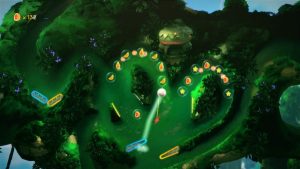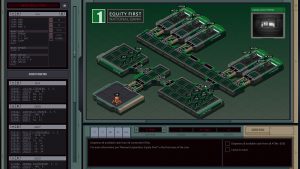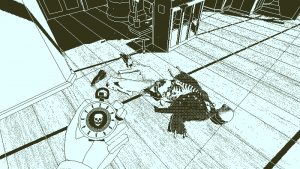The Roll the Dai 2018 Definitive Games of the Year List
Well, well, well, look what the cat dragged in. Looking a bit worse for the wear, ain’t ya? No worries, mate, cuz I got plenty of stew and no one to share it with. Wait a jot now, you look familiar. Do we know each other? I don’t mean to get all mystical on you, but haven’t we done this before?
No? Right. What precisely are you looking for then? Advice? Life lessons? Oooooh, video game recommendations, is it? That I’ve got, friend. That I’ve got. Settle in and know me better through these titles that found their way into my life in 2018.
10. Cypher

I’ve hyped Matthew Brown’s games before. His Hexcells series remains one of the best puzzle games I’ve ever played. There’s a pureness to his minimalist games that retains the cleverness of a well-designed paper puzzle and uses interactive elements just enough to make it feel at home on the computer.
Cypher is a bit different. The puzzles in Cypher are all cryptographic and most require a decent bit of paper and pencil work to solve. However, the environment is that of a museum – one where cryptography is both held in high esteem but also taught. The ability to walk between different puzzles as if they were exhibits eases the stress and tension of feeling like the player has to really solve any of them in a certain amount of time. The soft music and clean visuals filled me with a sense of calm, despite the tougher and tougher challenges I faced.
It’s certainly not for everyone, but if you’ve liked previous Matthew Brown games and have fancied yourself a bit of a codebreaker, Cypher may scratch that itch for you.
9. Frostpunk

Frostpunk does a bit of misdirection to achieve its magic trick, but it’s one that 11 bit studios has done before. See, Frostpunk masquerades as a city-building-simulation (just like This War of Mine pretends to be a survival game), only to reveal after teaching you the basics that what it truly cares about is creating stories and narratives.
Most city builder and simulation games take the guidelines set down by the genre as tenets: that the game must be a clash of systems that spark chaos and create emergent stories through the nuances of multiple simulation layers all trying to work in concert. Which, sure, is great if that’s what you enjoy, but for me, it makes the game feel like a weird puzzle box of inevitable failure without enough instructions.
Frostpunk seems like a game that could go that way, but the small number of scripted events that can occur, along with the well-designed laws system, mean that the game controls the story yet allows the player to feel like small deviations give their individual experience meaning. Also, everything is going horribly wrong in Frostpunk, so it never feels like something to be solved but rather an experience to be survived.
8. Yoku’s Island Express

I started playing this game only 5 days ago, so I’m as surprised as you are that it’s on this list, but some things are just meant to be.
Look, it’s simple. This game is a pinball metroidvania. It is cute, has good progression and level design, and knows enough about pinball to use standard pinball skill mechanics to make the gameplay feel satisfying.
If you don’t like pinball, don’t play this game. But if you’re like me and you wish there was a hybrid of every game genre and pinball, Yoku’s Island Express is a fantastic stop on the journey to that promised land.
7. Donut County

I’m not certain that Donut County, as a sum of its parts, completely holds together. That said, each of those parts is either extremely charming, fun, or thoughtful, so maybe a grand unified thesis isn’t necessary here.
Part the first: controlling a hole that things fall into is, to put it bluntly, a lot of fun. It’s easy to do, it’s fun to do, and the physics of objects tipping into the hole looks great.
Part the second: the writing – be it dialogue from the somewhat absurdist characters or the descriptions of objects in the trashpedia – is sharp, sarcastic, and surprisingly aware of our current moment in gaming and social media.
Part the third: the game plays with the themes of gentrification, capitalism, personal responsibility, game-playing motivations, and identity stereotypes. For a game about dropping stuff in holes, that’s plenty.
As I said, these parts don’t all combine satisfactorily all the time, but there are also 6 games above Donut County, so I’m not going to sweat it too much.
6. Forza Horizon 4

I’m just going to say it: Forza Horizon 4 is like Burnout, but better.
I fizzled off racing games a few years ago, when every time I’d start one, I would just feel tired. There was just so much driving! Who put all this driving in?? I realized, of course, that the problem was mine and not the game’s, but the breakup still hurt. I used to really have a soft spot for virtually tooling around in a vehicle.
With Horizon 4, it’s like Forza took every compelling feature that had ever been in a racing game and smashed them all into one package. Open world discoverables? Plenty. Story missions with actual progression? Present! Customization outside of torque differential (or some other random actual car thing I know nothing about)? There’s a floss emote! Wacky races? Look at that giant hovercraft you can race against in the screenshot! Acquiring new content via some kind of slot machine gatcha mechanic? Um…sure?
Oh, and it looks beautiful.
5. Into the Breach

I had my doubts about Into the Breach because it was being heavily touted as a game by Subset, who developed FTL. I know people that love FTL and that devoted hours, days, months to that game. I’m not that person. I found FTL interesting for a few hours and then stressful and frustrating for every minute after that. I didn’t want another FTL.
And despite its pedigree and its look and maybe even some of its marketing copy, Into the Breach is not another FTL. In some ways, it’s quite the opposite. FTL is intentionally unsolvable; it is about acquiring a vast array of knowledge over time and playing the percentages. It’s about knowing when you’re behind and cutting your losses. I’d call it, say, poker.
Into the Breach is chess. All the information is there and the solution is simply obscured behind the different possibilities. Sessions are short, success and failure are well-defined, and it all works with my brain so much better than FTL ever did.
It’s like those old chess puzzles in the newspaper, where you’re supposed to find mate in 3 moves, except you feel even smarter when you solve it and you get to solve it over and over for as long as you want.
4. Spider-Man

It was a bit of a year for Spider-Man, wasn’t it? A stunning new movie and a very solid video game both dropping in 2018 is a good year.
There isn’t any single thing about the Spider-Man game that feels truly revolutionary, but perhaps that’s for the best when we haven’t had a polished modern-day Spider-man video game. It has taken learnings from the Batman Arkham series, the Assassin’s Creed worlds, and even some of the combat spirit that’s part of Insomniac’s Ratchet & Clank DNA. The result is a fun world to explore, a good balance between following the story threads and being distracted by events that pop up, and a well-written set of characters and plot points that fit within the Spider-man universe.
With all this going for it, I’d forgive it if the combat got a bit boring, but even there, I think that the progression of enemy types, attack combos, and slight tweaks to strategies approaching combat as the game opens up keeps things relatively fresh. At the end of the day, it’s a really fun place to hang out, swing around, and fight some baddies.
3. Opus Magnum / EXAPUNKS


I know what you’re thinking: that’s two games! What a cheater! This list is null and void!!
I admit to a bit of malfeasance here, but they’re both Zachtronics games, Opus Magnum technically released in 2017, and you’d be forgiven on casual inspection if you believed those two screenshots above came from the same game.
All Zachtronics games are a bit the same, of course, and neither of these two cleave too far from the mold, but there’s something exciting about where Zachtronics games are going. From the first moment of SpaceChem, there was always an element of story to go along with the mind-squeezing spatial/logic puzzles that are the hallmark of such games. There was a bit of a mystery, but it always took a back seat to the actual puzzle gameplay.
With Opus Magnum (which also introduces a super-satisfying built-in GIF maker) and EXAPUNKS, story has become a much more integral part of the game. Both feature characters that matter and defined worlds, all supported by vivid art (for Opus Magnum) and voiced dialog (for EXAPUNKS). I care a lot more about what I’m doing in both games because there’s care and attention devoted to why I’m doing it. SpaceChem and TIS-100 had this, of course, but in such meager amounts that the games quickly became about the programming aspect of it.
The normal caveats for all Zachtronics games apply here – a lot of what you’re doing is still programming, and in EXAPUNKS, the fiction of being a hacker even ties into that. Opus Magnum probably has a wider audience, though, as you’re making machines to transmute elements in a way that abstracts from actual coding to logic-based problem-solving very well.
2. Florence

Florence is a video game short story that packs more emotion and heart into a streamlined 45 minute experience than most games can do in a dozen hours. With two non-white characters at its center, Florence also manages to be a rare case of minority representation in games without the race of the character becoming a central narrative point.
So, aside from that, what does Florence touch on? Well, let’s see. Childhood. Nostalgia. Parental relationships. Routine. Creative fulfillment. Attraction. Dating. Love. Cohabitation. Dreams. Heartbreaks. Identity. Life, man. Life.
And each of these moments is done so well! Each little interaction takes advantage of the way we naturally interact with our phones and somehow captures the emotional slice with the perfect gaming metaphor. There were so many times while playing Florence when I would bust out in a grin and – perhaps even more impressively – a few when my breath would catch and my heart would ache.
1. Return of the Obra Dinn

One year ago, I was unsure until I made my list what my so-called game-of-the-year would be. All of my top 3 were vying for that top spot, and all felt deserving of it. In 2018, once I had ventured a few hours into Return of the Obra Dinn, I knew that it was going to be at the top of this list.
Return of the Obra Dinn is a masterpiece. That, aside from the voice work (which is top notch), it was all done by one man makes me feel both awed and jealous. There are people who know about graphics who may be able to talk about how inventive the visuals are, but suffice it to say that they serve their purpose of feeling like you’ve stepped into history.
The game is, at its core, about stepping into frozen historical tableaus on a mysterious ship as an insurance claims adjuster to figure out happened. There’s a wonderful book that you make all your notes in as you catalog the motives, bodies, and events that took place on the Obra Dinn.
It was a game that infected my brain, that had me thinking about it when I wasn’t playing it, that engendered real moments of discovery, that had me feeling incredibly intelligent and numbingly stupid. It is perhaps the greatest detective game ever made. Everything about the game is meticulously crafted to support its solitary vision and experience – the sound, the visuals, the pacing.
The ending’s a bit quick and predictable, but when you’ve just consumed the best meal of your life, it feels ridiculous to complain that the dessert was a bit small.
Well, looks like the stew’s gone.
You were hungry, weren’t ya? No bother, I’m always glad to share. It’s nice having a friend around. Stick around a moment, why don’t you? I’ve only got a few more things to say, and then we can part ways once more.
- I was primed and ready to really dig Red Dead Redemption 2, but I just couldn’t find the time to get into it. Maybe I will this year, maybe I won’t. Maybe what made Red Dead Redemption so special for me was a one-time fluke.
- I played some Monster Hunter World and though it seemed like exactly the kind of game that is not for me, I found it oddly compelling. I’m excited to try multiplayer a bit more, because playing with friends makes everything better.
- I flirted with including the Shadow of the Colossus remake on my list, but I feel like so much of my love for playing that game one more time (which I certainly did) was wrapped up in nostalgia and history that it felt unfair to call it a 2018 game.
- I certainly spent a lot of time with free-to-play mobile games this year but their monetization strategies and pinches make it hard me to feel good about any of them. At this point, I can’t tell if this is a problem with me or the industry. I go back and forth every few months.
- Of the three 2017 games I hadn’t played yet last year but felt good about, Opus Magnum is on the list, Tacoma was quite good, and I never got around to West of Loathing.
- Here are three 2018 games that I didn’t get to, but I have good feelings about: Ashen, GRIS, and The Gardens Between.
- Here are three 2018 games that I liked but not quite enough to break the top 10: Celeste, CHUCHEL, and Dead Cells.
- Early Access and Games-as-Service are making it harder every year to distinguish what a release date even is anymore. Starting next year, I may reconsider my criteria for what games I consider eligible, even though this just a silly personal list and no one other than me cares about the criteria anyway.
All right. That’s the kit and kaboodle. There ain’t no more.
See you in another life, stranger.